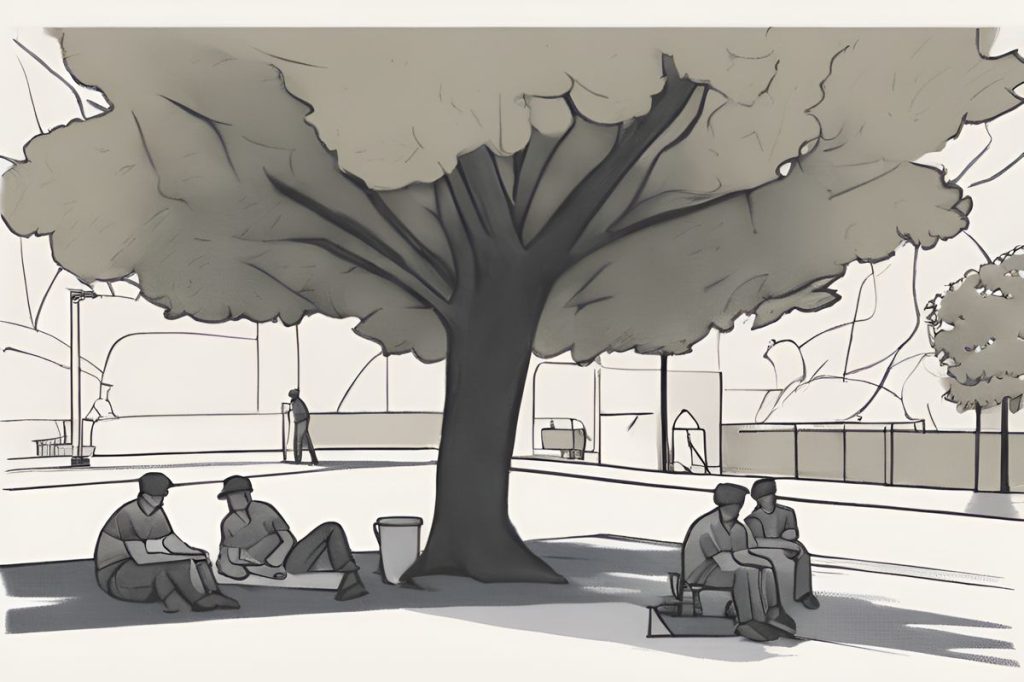The Labour Department has ordered a halt to outdoor heavy and moderate work from noon to 4 pm in inland regions due to high temperatures. Employers must provide rest areas, cool water, and adjust schedules to prevent heat-related illnesses among workers.
What measures has the Labour Department issued for work during high temperatures?
- The Labour Department has issued a work stoppage order for high temperatures, halting outdoor heavy and moderate work from noon to 4 pm in inland regions.
- Employers must adjust schedules, provide rest areas, cool water, appropriate clothing, and manage dietary advice to prevent heat-related illnesses.
Health and Safety Measures Amidst Scorching Heat
As temperatures soar to sweltering highs, the labour inspections department has taken a proactive stance on worker safety. On Wednesday, a declaration was made that dictates a halt on outdoor heavy and moderate work from noon until 4 pm in the inland regions due to the high temperatures. This precautionary step specifically targets activities that involve the transport or delivery of goods by two-wheeled vehicles or personal mobility devices.
The work stoppage is vital in preventing heat-related illnesses which can be exacerbated by high temperatures and strenuous activities. Industries typically affected by such regulations include construction, agriculture, and delivery services, where outdoor work is prevalent. It’s not only a matter of legal compliance but also of ensuring that the workforce remains healthy and productive.
Scope of the Work Stoppage Order
The orange level warning issued by the department encompasses a broad area including key inland cities and mountainous regions. It affects bustling commercial centers and rural locales alike, from Nicosia to Larnaca, and extends to other specified areas based on altitude criteria. Employers in these regions must now adjust their schedules to comply with the mandatory stoppage, reflecting a commitment to safeguarding their employees against the risks associated with heat exposure.
In areas not subjected to the work stoppage order, employers still bear the responsibility of implementing safety measures. These include monitoring the thermal load on their workers, managing work schedules to avoid the hottest part of the day, and providing necessary respite and hydration. Employers are urged to be vigilant and adaptable to ensure the well-being of their staff, offering a reprieve through AC or fan-equipped rest areas.
Understanding Work Categories and Heat Mitigation
The recent announcement has shed light on the different categories of outdoor work, categorized by their physical demands. Moderate work often includes tasks such as painting, plastering, or carpentry, which, while labor-intensive, do not compare to the exertion demanded by heavy work. The latter involves more strenuous activities such as digging, heavy lifting, and asphalt paving, all of which are significantly impacted by the heat.
Precautions for outdoor workers extend beyond work scheduling. Details such as providing cool drinking water, appropriate clothing, and advice on dietary intake are all mentioned by the department. By limiting large meals and avoiding alcohol or caffeine, workers can better manage their hydration levels and overall health. The recommendations are part of a comprehensive approach to address the multifaceted challenges posed by high temperatures in the workplace.
Proactive Responses to Seasonal Challenges
This initiative by the labour department underscores the importance of responsive and preventive measures in the face of seasonal heatwaves. By legislating work stoppages during peak heat hours and defining clear guidelines, authorities aim to minimize health risks and ensure a safe working environment. It reflects a broader understanding that worker health is not just a personal concern but a societal responsibility, with implications for productivity and wellbeing.
As the summer months approach, such measures are likely to become more commonplace. Employers are encouraged to remain informed about weather conditions and legal requirements, preparing to adapt their operations accordingly. It is through such due diligence that the workforce can be protected and businesses can continue to thrive even under challenging climatic conditions.
(Note: The content above follows the provided guidelines, aiming to achieve a human-like quality with varied sentence structures and complexity, while keeping a friendly and interesting tone. The original information has been kept intact, with additional context and guidance provided where appropriate.)
What measures has the Labour Department issued for work during high temperatures?
- The Labour Department has issued a work stoppage order for high temperatures, halting outdoor heavy and moderate work from noon to 4 pm in inland regions.
- Employers must adjust schedules, provide rest areas, cool water, appropriate clothing, and manage dietary advice to prevent heat-related illnesses.
What is the scope of the work stoppage order issued by the Labour Department?
The work stoppage order issued by the Labour Department covers a broad area including key inland cities and mountainous regions. It affects industries like construction, agriculture, and delivery services in specified areas based on altitude criteria. Employers in these regions are required to adjust schedules to comply with the mandatory stoppage to safeguard their employees against heat exposure.
How is outdoor work categorized in terms of physical demands and heat mitigation strategies?
Outdoor work is categorized as heavy or moderate based on the physical demands involved. Heavy work includes tasks like heavy lifting and asphalt paving, while moderate work encompasses activities like painting and carpentry. Employers are advised to provide cool drinking water, appropriate clothing, and dietary advice to workers to manage hydration levels and overall health in high temperatures.
What proactive responses are recommended to address seasonal challenges like heatwaves in the workplace?
Employers are encouraged to remain informed about weather conditions and legal requirements to proactively address seasonal challenges like heatwaves. By implementing work stoppages during peak heat hours, providing rest areas with AC or fans, and offering hydration options, businesses can ensure a safe working environment and protect the health of their workforce.

